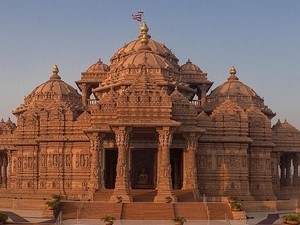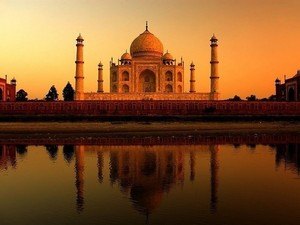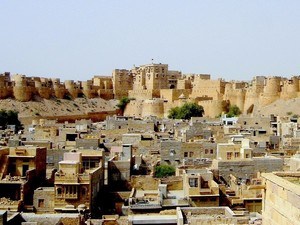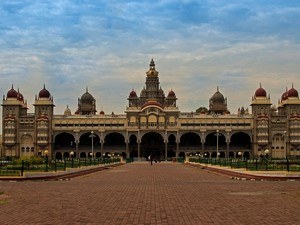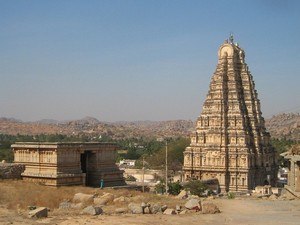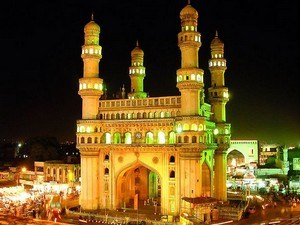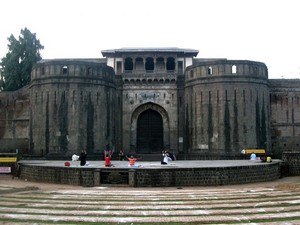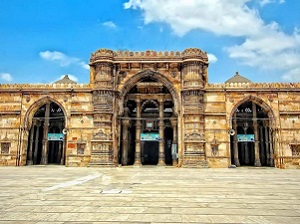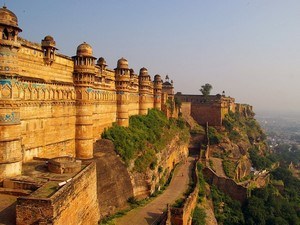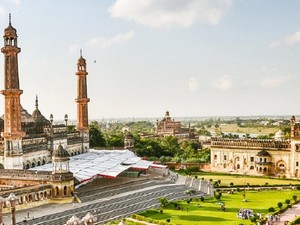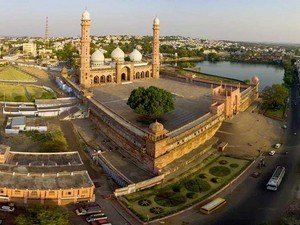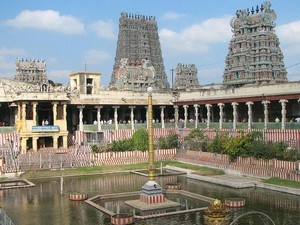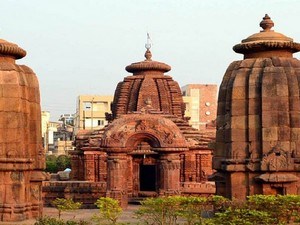1
DAY 1 : TRAVEL TO JAIPUR & JAIPUR SIGHTSEEING
DAY 1 : TRAVEL TO JAIPUR & JAIPUR SIGHTSEEING
 Sightseeing
Sightseeing
Leisure / No Sightseeing
At a distance of 13 km from Jaipur Junction Railway Station, Amer Fort or Amber Fort is located in Amer near Jaipur. It is one of the best-preserved forts in Rajasthan, and among the prime place to include in Jaipur packages.
Amber was founded by the Meenas in 967 AD and they dedicated the town to Amba, the Mother Goddess. Around 1037 AD, Amber was conquered by Kachhawa Rajputs and ruled from the 11th to the 18th century, until the capital was moved from Amer to Jaipur. The Amber Fort was built by Raja Man Singh in 1592 AD and it was further expanded by successive rulers. Man Singh was one of the trusted generals of Emperor Akbar and one among the Navaratnas of his court. Later in 1727 AD, Sawai Jai Singh II moved the capital from Amber to Jaipur.
The architecture of Amer Fort is influenced by both Hindu and Muslim styles. Among the famous tourist places in Jaipur, Amer .....
 Duration of visit: 2 Hours
Duration of visit: 2 Hours
 Timings: Timings: 8 AM to 5.30 PM
Timings: Timings: 8 AM to 5.30 PM
At a distance of 11 km from Jaipur Junction Railway Station and 8 km from Amer Fort, Jal Mahal or the Water Palace is a palace located in the middle of the Man Sagar Lake in Jaipur. This is one of the biggest artificial lakes in Jaipur. The lake used to be a bird watcher's paradise in the past and was a favorite ground for the Rajput kings of Jaipur for royal duck shooting parties during picnics.
Jal Mahal was built in 18th century by Sawai Madho Singh I. Jal Mahal was constructed for serving the purpose of a summer resort for his family and guests. The palace was renovated and expanded in the 18th century by Madho Singh II. The Jal Mahal palace is considered an architectural beauty built in the Rajput and Mughal styles of architecture. It provides a picturesque view of the lake from the Man Sagar Dam and the surrounding Nahargarh hills. The palace was built using red sandstone. It is a five storied building out of which four floors remain under water when the lake is full and the .....
 Duration of visit: 30 Mins - 1 Hr
Duration of visit: 30 Mins - 1 Hr
 Timings: 9 AM to 5 PM
Timings: 9 AM to 5 PM
At a distance of 11 km from Jaipur Junction Railway Station, Khole Ke Hanuman Ji is an ancient temple situated at Laxman Dungri in Jaipur. This temple is considered to be one of the famous temples in Jaipur, and among the must include places in Jaipur tour packages.
Khole Ke Hanuman ji Temple is dedicated to the Lord Hanuman. The inner sanctum of the temple is quite large and can accommodate 500 devotees. The temple is situated on a hillock and devotees have to walk around 1 km to reach the temple. The temple has an attractive entrance archway. The temple is known for its magical power and it is believed that the wishes of the devotees are always fulfilled. It is one of the popular Jaipur places to visit, especially for religious people.
The natural view of Aravali hill is magnificent from the temple and surrounding places. A large number of tourists .....
 Duration of visit: 1 Hour
Duration of visit: 1 Hour
 Timings: 6 AM to 8.30 PM
Timings: 6 AM to 8.30 PM
2
DAY 2 : JAIPUR SIGHTSEEING
%%Itinerary_Title_Day2%%
At a distance of 5.5 km from Jaipur Junction Railway Station, City Palace is a beautiful palace complex situated in the heart of Jaipur City. It is one of the popular palaces in Rajasthan, and among the famous places to visit as part of Jaipur tour.
The palace was built between 1729 and 1732 AD by Sawai Jai Singh II. He planned and built the outer walls and later additions were made by successive rulers till the end of the 20th century. City Palace was the seat of the Maharaja of Jaipur, the head of the Kachhwa Rajput clan. Part of the palace currently houses a museum, though the major part is still a royal residence. It one of the most famous Jaipur tourist places.
The City Palace reflects Rajput, Mughal, and European architectural styles although it was designed according to Vaastushastra. The Palace .....
 Duration of visit: 1-2 Hours
Duration of visit: 1-2 Hours
 Timings: 9 AM to 5 PM
Timings: 9 AM to 5 PM
At a distance of 5.5 km from Jaipur Junction Railway Station, Jantar Mantar is located near City Palace and Hawa Mahal in Jaipur. It is one of the top tourist places in Jaipur City. This monument is the largest of the five astronomical observatories present in India. The other four astronomical observatories are located at Delhi, Varanasi, Mathura and Ujjain. It features the world's largest stone sundial, and is a UNESCO World Heritage site.
The Jantar Mantar was built by the Rajput king Sawai Jai Singh II and completed in 1738 AD. The name is derived from jantar means yantra and mantar means calculation. The Jaipur observatory was functional for seven years only, as the Maharaja was not very successful in deriving accurate, astronomical observations. It was later restored in the year 1901 and was declared as a national monument in the year 1948.
The .....
 Duration of visit: 30 Mins - 1 Hr
Duration of visit: 30 Mins - 1 Hr
 Timings: 9:30 AM to 4:30 PM
Timings: 9:30 AM to 4:30 PM
At a distance of 6 km from Jaipur Junction Railway Station, Hawa Mahal is one of the prime tourist places to visit in Jaipur city. The palace sits on the edge of the City Palace and extends to the Zenana (women's) chambers. Hawa Mahal is often represented in promotion of Jaipur Tourism. Jaipur is among the top places to visit near Delhi.
The renowned Hawa Mahal or the Palace of Winds was constructed in 1799 by Maharaja Sawai Pratap Singh as a continuation to the stunning City Palace. The main architect of this palace is Lal Chand Ustad and the palace is believed to have been constructed in the form of the crown of Krishna, the Hindu God.
Hawa Mahal was built in Rajputana architectural style. The palace is constructed of beautiful red and pink sandstone and it looks like a five storeyed Pyramid. The palace stands on a podium which is fifty .....
 Duration of visit: 30 Mins
Duration of visit: 30 Mins
 Timings: 9 AM to 4.30 PM
Timings: 9 AM to 4.30 PM
At a distance of 6 km from Jaipur Junction Railway Station, Albert Hall Museum is a museum situated in Ram Niwas Garden outside the city wall opposite the new gate in Jaipur. It is the oldest museum in Rajasthan, and one of the popular places of sightseeing in Jaipur.
The Albert Hall Museum is functioning as the State Museum of Rajasthan. The Hall was built by Maharaja Sawai Ram Singh II. The foundation stone of Albert Hall was laid during the visit of the Prince of Wales, Albert Edward to Jaipur in 1876 and it was completed in 1887. The building was designed by Sir Samuel Swinton Jacob and was opened as a public museum in 1887. It is also called the Government Central Museum. Maharaja Ram Singh initially wanted this building to be a town hall, but his successor, Madho Singh II, decided it should be a museum for the art of Jaipur.
It is a fine example of Indo-European architecture. The design of .....
 Duration of visit: 1-2 Hours
Duration of visit: 1-2 Hours
 Timings: 9 AM to 5 PM on all days. Closed on Friday
Timings: 9 AM to 5 PM on all days. Closed on Friday
At a distance of 6 km from Jaipur Junction Railway Station, Jaipur Zoo is one of the most popular zoological parks in India, situated in Ram Niwas Gardens of Jaipur. The zoo is part of conservation breeding programs of the Central Zoo Authority and Government of Rajasthan for the ghariyal, cheetal and crocodile. A trip to the Zoo is one of the popular things to do in Jaipur city.
The zoo was opened in 1877 and is located near to the Albert Hall Museum. The Zoo is divided into two parts, the Animal Section and the Bird Section along with reptiles. One can spot more than 70 species of animals, birds and reptiles. The animal section accommodates a number of animal species like Lions, leopards, tigers, white tigers and panthers. One can also spot hyenas, alligators, tortoises, jackals, foxes, bears, and a diversity of deer. The zoo is also the residence of some multicolored species of birds that comprise geese, ducks, babbling lorry, white .....
 Duration of visit: 1-2 Hours
Duration of visit: 1-2 Hours
 Timings: 9 AM to 5 PM. Closed on Tuesdays
Timings: 9 AM to 5 PM. Closed on Tuesdays
At a distance of 6 km from Jaipur Junction Railway Station, Birla Mandir is a Hindu temple located at the base of Moti Dongri Hill in Jaipur. The temple is sometimes also referred to as the Laxmi Narayan Temple. It is one of the major places to visit in Jaipur.
This marvelous temple was built during the year 1988 by Birla Group of Industries, one of the business tycoons of India. According to history, the Birla temple was built on the land given to the Birla family by the Maharaja.
The Temple is dedicated to Lord Vishnu (Narayan) and his consort Lakshmi. The images of Lakshmi and Narayan attract the attention, being made out from one piece of marble. Standing on a raised platform, Birla Temple is made out with the premium quality of white marble. The temple looks stunning, when it is brightly lit in the night. The three huge domes of the temple represent three different approaches to the religion. .....
 Duration of visit: 1 Hour
Duration of visit: 1 Hour
 Timings: 6 AM - 12 PM & 3 PM - 8:30 PM
Timings: 6 AM - 12 PM & 3 PM - 8:30 PM
3
DAY 3 : TRAVEL TO JODHPUR & JODHPUR SIGHTSEEING
%%Itinerary_Title_Day2%%
 Sightseeing
Sightseeing
At a distance of 3.5 km from Jodhpur Junction and 6 km from Jodhpur Fort, Umaid Bhawan Palace is a royal palace located on Chittar Hill in Jodhpur City of Rajasthan, India. It is one of the world's largest private residences and also one of the popular Jodhpur tourist places.
Umaid Bhawan Palace is named after Maharaja Umaid Singh, grandfather of the present Maharaja Gaj Singh. Maharaja Umaid Singh had laid the foundations of this opulent 347 room edifice on 18th November 1929. However, the construction work started in 1943. It took 16 years to complete. This sandstone monument is the only 20th-century palace that was built for a noble cause. The purpose was to give employment to the people of Jodhpur during a long period of drought and famine.
Situated on Chittar Hill, the highest point in Jodhpur, the palace is a blend of Indian and European architectural influences. Edwardian architect Henry Vaughan .....
 Duration of visit: 1 Hour
Duration of visit: 1 Hour
 Timings: 9 AM - 5 PM
Timings: 9 AM - 5 PM
At a distance of 1 km from Mehrangarh Fort and 5 km from Jodhpur Junction, Jaswant Thada is a royal cenotaph located near Mehrangarh Fort entrance in Jodhpur city of Rajasthan state. It is famed as one of the most beautiful white marble cenotaphs in Rajasthan and also one of the popular Jodhpur tourist places.
Jaswant Thada was built by Sardar Singh of Jodhpur in 1899 CE in memory of his father, Maharaja Jaswant Singh II. This cenotaph is an example of architectural brilliance in India. Famed as the Taj Mahal of Marwar, Jaswant Thada is a perfect example of Rajputana style of architecture. It is a white marble memorial, built out of intricately carved sheets of marble. These sheets are extremely thin and polished so that they emit a warm glow when illuminated by the sun.
The main memorial has been built like a temple with intricately marble stone carvings, and impressive sculptures, frescos, domes and pillars. The cenotaph has two more tombs within it. The cenotaph of Maharaja .....
 Duration of visit: 30 Mins
Duration of visit: 30 Mins
 Timings: 9 AM - 5 PM
Timings: 9 AM - 5 PM
At a distance of 8 km from Mehrangarh Fort and 9.5 km from Jodhpur Junction, Mandore Garden is situated at Mandore, the former capital of Maharajas of Marwar before the establishment of Jodhpur. This is a popular picnic spot for the people of Jodhpur.
The extensive Mandore Garden has high rock hill terrace, making it a popular local attraction. The cenotaphs of former rulers of Jodhpur can also be seen inside the Mandore Garden. These cenotaphs are not of usual shape and are built along the lines of a Hindu temple. These are built of red sandstone and are four stories high, with fine columns and an elegant spire. The cenotaphs of the Maharani are set on a rocky outcrop over the hill. One of the most prominent cenotaphs is that of Maharaja Ajit Singh which was built in 1793 CE.
The garden also has a hall of heroes which holds idols of various folk heroes of the past. Their statues, carved out of rocks and enhanced with brilliant bright colors can be found in this hall. Adjacent .....
 Duration of visit: 1 Hour
Duration of visit: 1 Hour
 Timings: 8 AM to 8 PM, Museum: 9 AM to 6 PM on all days except Friday
Timings: 8 AM to 8 PM, Museum: 9 AM to 6 PM on all days except Friday
4
DAY 4 : JODHPUR SIGHTSEEING & TRAVEL TO UDAIPUR
%%Itinerary_Title_Day2%%
At a distance of 6 km from Jodhpur Junction, Mehrangarh Fort is an ancient hill fort situated in Jodhpur City. It is one of the renowned historical forts in Rajasthan, and among the must include places in Jodhpur sightseeing packages.
Situated at 410 feet above the city, Mehrangarh Fort was built by Rao Jodha in 1459 AD when he transferred his capital from Mandore to Jodhpur. The fort was named Mehrangarh, meaning 'Fort of the Sun'. Though the fortress was originally started in 1459 by Rao Jodha, most of the fort which stands today dates from the period of Jaswant Singh of Marwar (1638 -78). Today, this fort is preserved and owned by Maharaja Gaj Singh II - the current Rathore ruler.
According to popular folklore, it is believed that to develop the Mehrangarh Fort, the Rao Jodha displaced a hermit called Cheeria Nathji (The lord of birds), who was the hill's lone human occupant. Being angry upon this forced displacement, .....
 Duration of visit: 2 Hours
Duration of visit: 2 Hours
 Timings: 9 AM - 5 PM
Timings: 9 AM - 5 PM
At a distance of 1 km from Jodhpur Fort and 5 km from Jodhpur Junction, Rao Jodha Desert Rock Park lies at the foot of Mehrangarh Fort in Jodhpur city of Rajasthan.
The Park extends across 70 hectares about 200 acres of rocky land surrounding the fort. It was created in 2006 for restoration of natural ecology of rocky wasteland and was opened to the public in 2011. This sandy desert park has rock loving plants which adapts to the arid surroundings.
Mehrangarh Fort here was once a rocky wasteland, colonised by an invasive plant from Mexico known as mesquite or baavlia. In 2006, Jodhpur's current maharaja Gaj Singh II entrusted filmmaker and environmentalist Pradip Krishen with the mammoth task of converting this baavliadominated wasteland into a green zone. It was Gaj Singh's great grandfather Maharaja Umaid Singh's wish to convert this arid landscape into a green zone. But the painstaking efforts of a man and his team have transformed the land into a paradise for migratory .....
 Duration of visit: 1 Hour
Duration of visit: 1 Hour
 Timings: April to September - 7 AM to 6.30 PM,October to March - 8 AM to 5.30 PM
Timings: April to September - 7 AM to 6.30 PM,October to March - 8 AM to 5.30 PM
At a distance of 33 km from Kumbhalgarh Fort, and 97 km from Udaipur, Ranakpur Jain Temple is a holy place situated at Ranakpur near Sadri town in the Pali district of Rajasthan. Ranakpur is one of the five most important Jain pilgrimage sites of India and among the most famous places of pilgrimage in Rajasthan.
These Jain temples are dedicated to Lord Adinath, who was the first Jain Tirthankara. The most popular of the Jain temples present in the place include the Chaumukha Temple. Ranakpur is one of the prominent pilgrimage places to visit near Udaipur. Maharana Kumbha allotted land and encouraged his minister Dharana Shah to build this famous Jain temple. Dharana Shah under the spiritual influence of Acharya Somasundarsuriji has selected the plan of Depak of Mundara to construct the temple. The construction of the temple began in the year 1446 and in 1496 the idol .....
 Duration of visit: 1 Hour
Duration of visit: 1 Hour
 Timings: 6 AM to 6 PM
Timings: 6 AM to 6 PM
5
DAY 5 : UDAIPUR SIGHTSEEING
%%Itinerary_Title_Day2%%
At a distance of 3 km from Udaipur City Railway Station, Udaipur City Palace is a beautiful royal palace complex situated on the banks of Lake Pichola in Udaipur city of Rajasthan. This majestic palace is the largest palace complex in India, and among the must include places in Udaipur packages.
The City Palace was built initially by Maharana Udai Singh in 1559 AD when he shifted his capital from the erstwhile Chittorgarh to the newly found city of Udaipur. The Palace was built over nearly 400 years, with contributions from several rulers of the Mewar dynasty.
Among the top Udaipur tourist places, the City Palace boasts of a wonderful blend of Medieval European and Indian architectural styles. Set at an average elevation of 598 m, the Palace has several towers, domes, and arches, which add to the flavor of the heritage site. Courtyards, pavilions, .....
 Duration of visit: 2 Hours
Duration of visit: 2 Hours
 Timings: 9.30 AM to 5.30 PM (last entry 4.30 PM)
Timings: 9.30 AM to 5.30 PM (last entry 4.30 PM)
At a distance of 2.5 km from Udaipur City Railway Station, Pichola Lake is an artificial fresh water lake situated in the heart of Udaipur city in Rajasthan. Surrounded by hills, gardens, temples and havelis, Lake Pichola is one of the most beautiful lakes in India and a popular tourist attraction in Udaipur.
Pichola Lake was built in 1362 AD by Pichhu Banjara, a gypsy Banjara tribesman who transported grain, during the reign of Maharana Lakha. Later, Maharana Udai Singh, impressed by the charm of this lake with the backdrop of green hills, founded the city of Udaipur on the banks of the lake and also enlarged the lake by constructing a stone masonry dam in the Badi Pol region.
Lake Pichola is one of the several contiguous lakes, developed over the last few centuries in and around Udaipur city. Named after nearby Picholi village, Pichola Lake is nearly 4 km long and 3 km wide. The lake has a surface area of about 696 hectares .....
 Duration of visit: 30 Mins - 1 Hr
Duration of visit: 30 Mins - 1 Hr
 Timings: Boating Timings: 9 AM to 6 PM
Timings: Boating Timings: 9 AM to 6 PM
BREAK FOR MEALS / HOTEL CHECK-IN | CHECK-OUT / SHOPPING / LEISURE
At a distance of 2 km from City Palace and 3 km from City Railway Station, Bagore Ki Haveli is an old royal building situated in front of the Lake Pichola at Gangori Ghat in Udaipur. This is one of the top places to visit in Udaipur.
Built by Amir Chand Badwa, the Chief Minister of Mewar Royal Court, it dates back to the 18th century. Maharana Shakti Singh of Bagore, who resided in the haveli, incorporated three storeys to the main structure, in 1878 AD. This ancient edifice has more than hundred rooms and displays delicate carvings and glass work. After being deserted for 50 years post-independence, the haveli was finally handed over to the West Zone Cultural Centre in 1986 for restoration. Today, the Haveli looks glorious and also houses a museum in its premises with paintings and costumes of the Royal Kings.
The interiors of the Haveli are embellished with intricate and fine mirror work. One can also see the private quarters of the royal ladies, their bath areas, dressing .....
 Duration of visit: 1 Hour
Duration of visit: 1 Hour
 Timings: 10 AM to 5 PM,Dance Show: 7 PM to 8 PM
Timings: 10 AM to 5 PM,Dance Show: 7 PM to 8 PM
At a distance of 3 km from Udaipur City Railway Station, Jagdish Temple is a Hindu temple located in the City Palace complex of Udaipur. This is one of the famous temples of Udaipur and among the top Udaipur attractions.
Sri Jagdish Temple is dedicated to Lord Vishnu (Laxmi Narayan), the preserver of the Universe. The temple was built by Maharana Jagat Singh with an estimated cost of 1.5 million rupees in 1651 AD. It is celebrated for being the largest temple in the city of Udaipur. The gateway of this temple can be sited at a distance of 150 meters from the Bara Pol of the City Palace. The temple was originally called the temple of Jagannath Rai but is now called Jagdish Temple.
This temple is built in the Indo-Aryan style of architecture. This three-storied temple is a wonder of architecture that comprises beautifully carved pillars, decorated ceilings, painted walls and lush halls. The first and the second storey of the .....
 Duration of visit: 30 Mins - 1 Hr
Duration of visit: 30 Mins - 1 Hr
 Timings: 5 AM - 2 PM & 4 PM - 8 PM
Timings: 5 AM - 2 PM & 4 PM - 8 PM
6
DAY 6 : UDAIPUR SIGHTSEEING
%%Itinerary_Title_Day2%%
At a distance of 12 km from Udaipur City Railway Station and 10 km from City Palace, the Monsoon Palace, formerly known as the Sajjangarh Palace, is a hilltop royal palace overlooking the Fateh Sagar and Pichola Lakes in the city of Udaipur.
The Palace is named Sajjangarh after Maharana Sajjan Singh (1874-1884) of the Mewar Dynasty, who built it in 1884 AD. He was the 72nd ruler of the Mewar Dynasty. The Place reflects the rich cultural and history of Mewar Kingdom. It was built primarily to watch the monsoon clouds; hence, it is popularly known as Monsoon Palace.
The palace, built with white marble, is located on Bansdara peak of the Aravalli hill range at an altitude of 944 m (3100 feet). The intention of Maharana Sajjan Singh was to build a nine storey complex, basically as an astronomical center and to keep track of the movement of monsoon clouds in the area surrounding the palace, and also to provide employment to people. .....
 Duration of visit: 1 Hour
Duration of visit: 1 Hour
 Timings: 9 AM to 6 PM
Timings: 9 AM to 6 PM
At a distance of 8.5 km from Udaipur City Railway Station and 7 km from Sajjangarh, Shilpgram is a rural arts and crafts complex situated near Havala village in Udaipur city. Also known as The Craft Village or The Artisan's Village, Shilpgram is one of the best places to visit in Udaipur.
Inaugurated by Rajiv Gandhi in 1989, the rural arts and crafts complex is spread over an undulating terrain of 70-acres of land and is surrounded by Aravali mountain range. Shilpgram is an ethnographic museum that depicts the lifestyles of the folk and tribal people of the region. The main purpose of setting up Shilpgram is to increase the knowledge and awareness of the rural arts and crafts for the younger generation. The center witnesses several workshops specially conducted for children who are interested in learning arts, crafts, music and theatre.
The Complex has an open air Amphitheatre with a seating capacity .....
 Duration of visit: 1-2 Hours
Duration of visit: 1-2 Hours
 Timings: 11 AM to 7 PM
Timings: 11 AM to 7 PM
At a distance of 6 km from Udaipur City Railway Station and 6 km from City Palace, Sahelion Ki Bari or Garden of Maidens is a major garden located on the banks of Fateh Sagar Lake in Udaipur.
Sahelion Ki Bari was built by Maharana Sangram Singh in the 18th century. The garden was laid for a group of 48 young women attendants who accompanied a princess to Udaipur as part of her dowry. The king wanted a separate area for them, where they could spend their time leisurely. This patterned garden used to be the popular relaxing spot of the royal ladies. The garden is also known as the 'Garden of the Maids of Honour' for the same reason.
The garden set below the embankment of the Fateh Sagar Lake has beautiful lotus pools, marble pavilions and elephant shaped fountains. These fountains are fed by the water of the lake gushing through ducts made for the purpose. Each water channel has its different sound and the blend of these sounds complement the atmosphere of the place. There is .....
 Duration of visit: 30 Mins
Duration of visit: 30 Mins
 Timings: 9 AM to 5 PM
Timings: 9 AM to 5 PM
At a distance of 6 km from Udaipur City Railway Station and 5 km from Udaipur City Palace, Fateh Sagar Lake is an artificial lake situated besides the entrance to Moti Magri Hill and to the north of Lake Pichola in Udaipur city of Rajasthan.
Named after Maharana Fateh Singh, Fateh Sagar Lake was initially constructed by Maharana Jai Singh in 1678 AD. However, after a span of 200 years, the earthen bund, which formed the lake, was washed away during floods. Thereafter, Maharana Fateh Singh built the Connaught Dam on the Lake to mark the visit of Duke of Connaught, son of Queen Victoria in 1888 AD. The dam enlarged the lake and was later renamed as Fateh Sagar Lake.
It is one of the four beautiful lakes in the city, the other three being the Lake Pichola, Udai Sagar Lake, and Dhebar Lake or Jaisamand Lake. Fateh Sagar is 2.4 km length, 1.6 km width and 11.5 meter in depth. During the monsoons, the lake covers the total area of .....
 Duration of visit: 1 Hour
Duration of visit: 1 Hour
 Timings: 8 AM to 4.30 PM
Timings: 8 AM to 4.30 PM

